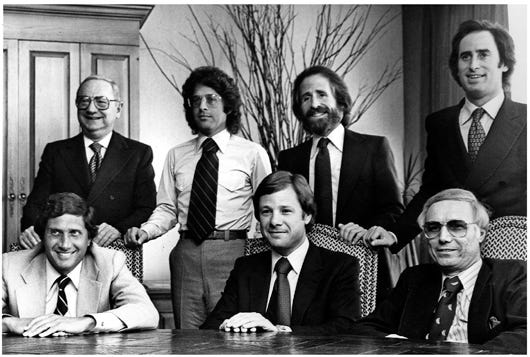What's The MO?
I've read books that look at show biz from the actor's perspective, the writer's, the director's, even the producer's. But up till now, I never thought of things from the agent's point of view. Which made Who Is Michael Ovitz?--written by Ovitz himself--an interesting book.
I'd heard of Ovitz, of course. Everyone has. He was the super-agent who helped found Creative Artists Agency, which practically ran Hollywood in the 80s. He was also known for an explosive meeting with screenwriter Joe Eszterhas (according to Eszterhas), and for a disastrous, short-lived tenure as President of Disney. In Who Is Michael Ovitz?, the generally tight-lipped Ovitz gets to tell his side of the story.
Born in 1946, he grew up not very rich in the not very exciting neighborhood of Encino located in the not very fashionable San Fernando Valley. But he always had big dreams and an indefatigable work ethic. While attending UCLA he got a job as a tour guide at Universal Studios where he started making connections.
He later got a job in the mailroom at William Morris, the top show biz agency--even though the shop was beginning to show its age. He worked his way up, but, along with some other young Turks, wasn't satisfied with his opportunities and so co-founded CAA in 1975 with four fellow agents.
The William Morris Agency tried to crush these upstarts, but, with Ovitz's leadership, they proved too fast on their feet. In fact, they grew exponentially, and were never happier than when poaching Morris clients.
CAA was noted for being a full service agency. The whole organization would work for you. And they worked insanely hard, being on the job all waking hours. They soon accumulated enough top names that, while they didn't quite have a monopoly, they represented a critical mass of show biz talent.
CAA started putting together packages--buying the stories, assigning the writers, actors and directors, and selling it all to the studios for top dollar. In effect, CAA was the studio, and the actual studios were little more than distributors. The studios themselves weren't thrilled, but what could they do?
Ovitz could be harsh, and had a drive to crush the competition, but was he good for movies (and not just his clients)? Well, CAA was certainly behind a lot of hits--Jurassic Park, Ghostbusters, Tootsie, Dances With Wolves, Schindler's List, Out Of Africa, Goodfellas, Rain Man and many others. But was this because they knew what they were doing, or because they represented talent who were going to make their movies somewhere no matter who repped them?
Agents had always been a necessary evil. The top talent naturally wanted representatives to field offers and negotiate on their behalf. But Ovitz changed the equation, and now talent was more involved than ever in making creative decisions (including getting self-indulgent projects off the ground which the studios would never have made, and which generally flopped). But even then Ovitz understood being an agent isn't the greatest job. After all, they're not making art, they're making deals--when they're not spending their time returning calls to stay in touch and holding the hands of spoiled rich people.
It was in 1989 when Joe Eszterhas left CAA, leaking information on a meeting with Ovitz, claiming Ovitz had used threatening language. In his book, Ovitz dismisses the incident as an absurd and dishonest overreaction from a minor client who was more temperamental than he was worth. But still, perhaps this was when Ovitz started to look for an exit more than ever.
Ovitz had been doing deals bigger than just movie packages--he oversaw the buying and selling of entire studios. Indeed, it was often suggested that he should run a studio. Being in the position to greenlight productions, rather than trying to make a deal happen, would be a great position of power. Ovitz finally succumbed to the blandishments of close friend Michael Eisner, who in the mid-90s was Chairman of Disney, and accepted the slot of President of Disney. But as soon as Ovitz made the jump in late 1995, he felt undercut at every turn by Eisner, and lied to about what his powers would be. (Not that Ovitz would ever be a good number two man even under the best circumstances.) By early 1997, Ovitz was out.
Ovitz has since been involved in various ventures, including business in Silicon Valley, but his name has never evoked the same fear and awe. But then, he's not a young Turk any more. Maybe it's better he has more free time, for both himself and his family. And no matter what else, he's still got his legend.




0 Comments:
Post a Comment
<< Home